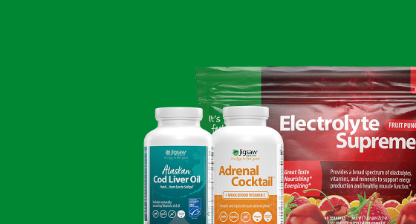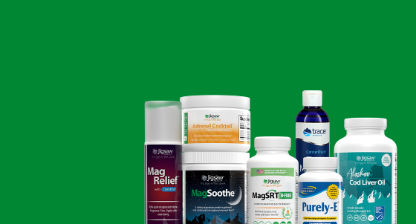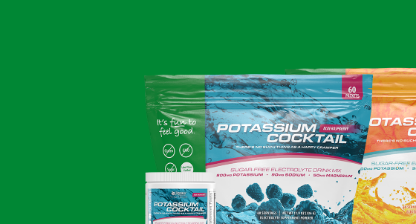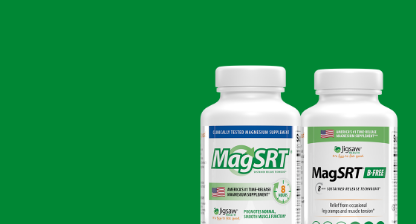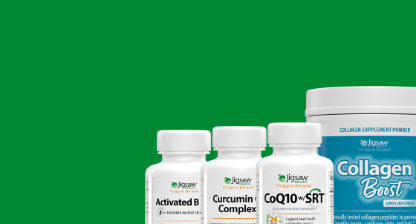Are you on a low-carb diet?
Are you feeling dehydrated more than you used to?
Thomas DeLauer breaks down the science behind how your Kidneys, Insulin, and Carbohydrates affect hydration. But don't sweat it. He also provides the best way to stay hydrated during a low-carb diet on the latest #ScienceSaturday.
Make sure you are meeting the RDI 400mg of Magnesium per day with Jigsaw's MagSRT – America's #1 Time-Release Magnesium Supplement.
Click here to add 6 bottles of Jigsaw MagSRT™ to your cart and save $70.84 + FREE Shipping.
Transcript by Rev.com
- What's going on, Jigsaw? We all know that minerals are the key to the proper electrical current within our body, but what about when it comes down to a low-carb diet? I've talked about some things before. Let's talk about specifically how the kidneys, how insulin, and how carbohydrates all work together in harmony, or lack thereof, to really make our lives amazing, or ultimately not.
- Let's talk about ketosis and dehydration. So, when you're on a low-carb diet, you usually feel a little bit dehydrated. You might wonder why am I urinating all the time, or why do I need to drink a lot more water just to feel like I'm hydrated. The answer is actually very simple and very practical. We know how the kidneys work and how carbohydrates work with response to insulin.
- Whenever you consume a carbohydrate, and it is stored in the form of glycogen, glycogen of course being the carbohydrates that are stored in your muscles, we end up holding approximately three to four grams of water. Why do we do this?
- Well, it's not just because carbs are like starches that absorb water, it's more so because carbohydrates cause a spike in insulin. Insulin tells the kidneys to hold onto water. Now there are a multitude of reasons as to why this occurs, but we don't need to go into elaborate detail there.
- All we need to know is that when we consume carbohydrates, we end up spiking our insulin. Insulin communicates with the kidneys to say hey, I want to hold onto this sodium. It has to do a lot of times with just electrolyte balancing and the additional water that is required for internal leverage with that glycogen. But again, story for another day.
- So, as our insulin levels drop and as our glycogen store slowly start to deplete as we're on a low-carb or ketogenic diet, the kidneys no longer send the signal to hold onto sodium and water quite as much. They start allowing the body the excrete it. This is a natural thing that is actually pretty darn cool. It's one of the reasons why when you first start a ketogenic diet, you feel so much better.
- A lot of times, you're losing some of that edema, you're losing some of that inflammation that's associated with higher sodium consumption, which is quite honestly what a lot of us are consuming. We're consuming a lot of sodium in processed foods. When we get rid of the body's ability to hold onto that, we feel a lot better, and quite honestly we look a lot better, and we might even reflect a little bit of a lighter weight on the scale.
- Now where this starts the become a problem is when it goes a little too far. You see, the kidneys are now no longer telling the body to hold onto sodium and water, so the body is just excreting it. That's why you're peeing so much. But you're not just losing water, you're losing more sodium. It's this vicious cycle. Now you've lost water. You're already dehydrated. But now you're losing sodium.
- Any little bit of chance that your body could have to hold onto water is already starting to go. If you're not adding it back in, then you run into another problem, and that's the fact that most of the ketogenic foods that people eat, bacon, things like that, cheese, they all have very low-quality sodiums in 'em, very low-quality salt.
- We're talking about unopposed sodium, which you hear me talk a lot. That means straight up iodized salt, table salt, total garbage that doesn't have a plethora of minerals required to keep a nice homeostasis of minerals. We deplete our good minerals and we replenish them with bacon minerals. I'm just gonna call 'em bacon minerals because it's just cruddy, cruddy salt.
- Then we have this gross imbalance. We have a lot of this weird unopposed sodium that's causing us to hold water in weird places, and then we're losing our potassium, we're losing our magnesium, we're losing some of this other minerals. We're completely thrown off kilter and we lose our electrical system. We lose our ability to really have our nerves fire and function in a proper way. I've talked about this before, but maybe when you're working out on a low-carb diet, you feel like you have energy, but it's like you can't make the mental connection to your muscle. It's like you try to lift, you try to squat, you try to do anything like that, and you're just not feeling it. It's just not happening.
- That's, a lot of times, because you're losing that neural connectivity because the electrical system of your body is thrown off because you have electrical currents that are not operating the right way. This will not only cause you to feel weak, but it's also gonna make your brain function weird, which is exactly why people end up getting a keto flu.
- It's an electrolyte imbalance, and your body is just not adjusted to your kidneys excreting a lot of sodium because of the lack of insulin. Now additionally you get dehydrated because you're simply not going to want to drink as much. Even though you need to be drinking more water, your levels of cholecystokinin, your levels of all kinds of other hormones that cause you to want to eat and drink are usually suppressed. Your appetite goes down so therefore your appetite for water goes down.
- You also don't have starches sitting in your gut. Yet even though starches are not the reason that carbohydrates cause us to hold water, they still have an effect like that in the stomach. It's like pouring water into bread. It's gonna soak it up. If you're consuming some starches, it's gonna soak up some of the water in your stomach, in your digestive system, therefore, you're gonna get thirsty, you're gonna want to drink more water. It's pretty simple that you're gonna drink more water along with carbohydrates. It's not that appetizing to think about drinking a quart of water along with your macadamia nuts and your avocado oil. It just doesn't sound appealing.
- What do you do? How do you combat this ketosis or low-carb dehydration so you can truly feel your best and not feel like you're really just slumping along with no electrical current running through your body? Of course the main thing is, you need to add some sodium to your diet in a high quality way.
- Himalayan pink salt, truffle salt, Brazilian sea salt, things like that that have a plethora of different minerals, not iodized table salt. Doing this is going to help you immensely. Yes, the numbers need to be a little bit higher than they ordinarily would. You need to go like three to five grams, three to 5,000 milligrams of sodium per day to keep yourself adequately hydrated and keep your mineral balance where it needs to be. Very, very important on a low-carb diet.
- Now additionally you want to be allocating the sodium to the morning as much as you can. This again has to do with the adrenals, it has to do with the kidneys. Our adrenals and our kidneys are functioning a little bit more efficiently and a slightly different way in the morning. If you add some sodium in the morning, it's gonna allow your body to utilize the kidneys and utilize the adrenals a little bit better, therefore making it so that you don't have the negative implications of a low-carb diet and dehydration later on in the day.
- Additionally if you know you're going to be working out, if you know you're gonna be exerting some energy, even if it's just carrying some boxes or lugging something around, you need to load up on sodium before then. Any time you start to sweat, you are depleting your stores of sodium. Ordinarily your kidneys are going to be able to process and tell you to hold onto more. But remember, you're losing that mechanism on a low-carb diet. Any sodium you lose through sweating, you're gonna actively have to replenish afterwards.
- Better off to just replenish it beforehand because then not only do you already have this almost preloading but you also give yourself an energy boost because now you're giving yourself the electrical current to help you through that. That's why I use a little pinch of pink Himalayan salt before I work out even if I'm totally fastened. It helps me out immensely. It makes a big difference. I feel like I actually get a little bit more of a pump. I also feel like I get the right blood flow and nutrient delivery. But more importantly, I feel like my brain is communicating with my muscles, which quite honestly is important if you're working out.
- And then last but not least, this is more so just so you don't feel miserable, any carbs that you do consume, whether it's an accident or whether it's planned or whether it's a scheduled refeed meal, keep your sodium levels lower because when you have those carbohydrates, your insulin sensitivity is gonna be very high, which means your kidneys are just gonna be standing guard ready to hold onto sodium.
- Have you ever noticed that it doesn't take much when you have a cheat meal to hold onto a ton of water? It's not so much that you had a cheat meal, it's more so that you combined carbohydrates and sodium, and your kidneys are saying ha ha, okay, insulin sensitivity is high, let's hold onto as much sodium as possible. It makes you puffy and moon face till the next day. That's what's going on. That's what you have to be cognizant of.
- So, cheat meal, carbohydrates, keep the sodium out of the equation. But at least now you know what's happening and why you're dehydrated, and you can start taking the process and taking the proper measures to make sure it doesn't become a bigger problem. You know you're losing sodium but you're also losing those other minerals.
- If you want to make sure that you're keeping the proper balance with that salt that you're adding to the diet, make sure you head on over to Jigsaw and pick up some MagSRT so you have that sustained release energy that you need through proper mineral absorption.
- Have I mentioned already that we published a clinical trial? We have found 22% increase in serum magnesium, 30% increase in magnesium RBC, and 63% decrease in magnesium deficiency symptoms. Click on the link and get your bottle today. See you soon.


